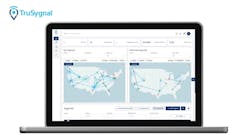The rash of supply chain problems that have plagued the transportation and freight industries has become severe enough to garner enough national attention that the White House is trying to devise a solution for this year and the future.
The Biden administration launched Freight Logistics Optimization Works, or FLOW, to share critical data on goods movements among supply chain stakeholders, which include trucking fleets, logistics providers, shippers ports, and more.
“Greater transparency—knowing where a vessel or a container is at every stage of transit—would provide the predictability cargo owners and logistics providers need to optimize the use of resources,” said Griff Lynch, executive director of Georgia Ports Authority, one of three port organizations involved in FLOW. “Through better communication, aspects of the supply chain such as timing on production, staffing, trucks and chassis, and warehouse space can be fine-tuned for greater efficiency and velocity.”
See also: Strategies for navigating supply chain disruptions
Georgia Ports Authority is one of 18 initial participants in FLOW, which was detailed in a White House fact sheet released on March 15. This group of 18—which also includes trucking logistics providers, terminal operators, ocean carriers, logistics companies, and LTL carriers—will work together with the administration to develop a proof-of-concept information exchange to ease supply chain congestion, speed up the movement of goods, and ultimately cut costs for American consumers, the White House said.
“Our current suboptimal data infrastructure and lack of appropriate data sharing undermine the competitiveness of the U.S. supply chain and U.S. national security,” according to Jeff Weiss, chief counsel to the Supply Chain Optimization and Resilience Coalition. “The SCOre Coalition applauds the administration for taking steps to address this urgent issue by endorsing the concept of a national freight data portal and agreeing to work closely with the private sector to bring it to fruition.”
Weiss added that by creating more collaboration, real-time visibility, and the “ability to plan for supply chain actors, a portal would enhance the efficiency, agility, and resilience of the U.S. supply chain and make the U.S. less vulnerable to supply chain disruptions.”
DOT looks to lead FLOW
The U.S. DOT will lead the project as “an honest broker and convener to bring supply chain stakeholders together to problem solve and overcome coordination challenges,” according to the White House. This initial phase aims to produce a proof-of-concept freight information exchange by the summer.
The trucking-related organizations involved include FedEx, UPS, C.H. Robinson, Prologis, DCLI, FlexiVan, and others. FLOW will also include the ports of Long Beach and Los Angeles, and Georgia Ports Authority. Others businesses involved in the initiative, some of which run private fleets, including Albertsons, Gemini Shippers, Land O’ Lakes, Target, and True Value.
In 2021, the ports, trucking, and freight industries moved a historic amount of goods with record holiday sales and delivery times below pre-pandemic levels, according to the White House. Retail inventories—excluding autos—are 6% higher than at the end of 2019, and products at grocery and drug stores are 90% percent in stock, which the White House said is 1% below pre-pandemic levels.
While starting with limited participation, DOT announced it also wants to hear from others interested in becoming part of FLOW as it hopes to grow the initiative. Within one month of the FLOW launch, DOT will launch a web page to gauge industry interest in participation and data sharing for a potential long-term FLOW effort.
The White House added that FLOW will start with three primary goals “to ensure cargo is getting from ship to shelf.”
Reduced dwell time at Los Angeles and Long Beach ports. At the beginning of November, with support from the Administration, the Ports of Los Angeles and Long Beach proposed charging the ocean carriers for cargo that dwelled on the docks for nine days or more, which led to about a 60% reduction in the number of long-dwelling import containers on the docks to date.
Alleviated congestion at the Port of Savannah by funding the Georgia Ports Authority pop-up container yards project. With this policy change, the Georgia Port Authority was able to reallocate more than $8 million to convert existing inland facilities into five pop-up container yards in both Georgia and North Carolina. Since the temporary container yards opened in late November, the container yards have provided relief to about 5,000 containers over eight weeks and freed up more dock space, speeding goods flow in and out of the Port of Savannah.
Secured commitments to move towards 24/7 operations via a presidential call to action to encourage every link in the goods movement chain to move towards a 24/7 pace to increase the volume and pace of products flowing through the system. The ports of Los Angeles and Long Beach and International Longshore and Warehouse Union (ILWU) workers joined to make the first commitment.
“Data is critical to all participants in the supply chain, and in the ocean environment, there is tremendous opportunity to achieve better optimization of current data by making more effective use of it from origin to delivery point,” said Udo Lange, FedEx Logistics president and CEO.



